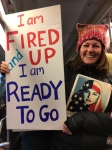 Since the evacuation of the HMS Birkenhead in 1852, “women and children first” has been the code of conduct to protect the most helpless among us from impending disaster. Today we look to them not only to save themselves but to save the rest of us as well.
Since the evacuation of the HMS Birkenhead in 1852, “women and children first” has been the code of conduct to protect the most helpless among us from impending disaster. Today we look to them not only to save themselves but to save the rest of us as well.
Last year, women were marching. Today, they are running for office in record numbers. Four hundred seventy females are vying for House and Senate seats, up from 312 in 2016. In addition to the 50 Democratic and 10 Republican congresswomen expected to run for re-election, there are 183 Democratic women and 14 Republican women running in primaries to challenge their current U.S. Representative. Mississippi has never had a female member of Congress, but three of the eight candidates to replace retiring member Gregg Harper in that Republican district are women. More than half the women running for House seats in Texas won their primaries. Texas Democrats nearly doubled their 2014 primary turnout! Veronica Escobar and Sylvia Garcia could be the first Latinas to represent Texas in Congress.
Women vote. They will play a key role in the 2018 mid-term elections. But what will they do? Black women voted overwhelmingly for Clinton in 2016. Not so, white women, 53 percent of whom supported Trump in 2016. Now, perhaps spurred on by the #MeToo movement, and prodded by Donald Trump’s performance in office, white women, seem to be shifting. Recent polls have Trump’s level of support with that demographic down to 42 percent. Just 27 percent of college-educated white women now support Trump. Support among non-college-educated white women has also dropped. A word of caution: the results in Roy Moore’s Senate race last fall were not particularly encouraging. Despite his reputation as a sexual predator, white women still favored him over winner Doug Jones.
Young people also seem newly activated. The Parkland, FL shooting triggered a student movement for enhanced gun safety. Friday, Republican Governor Rick Scott signed a bill passed on a bipartisan basis by the Florida legislature. While the bill failed to yield an outright ban on assault weapons, as many students wanted, it did impose a three-day waiting period for most purchases of long guns, raise the minimum age for buying weapons to 21, ban the sale or ownership of bump stocks and provide nearly $100 million to improve school security. The bill also contains a new process for removing weapons from people deemed to be a risk to themselves or others. The ink was barely dry on the new law before the NRA filed suit against it. None of this would have happened without the Parkland students and their supporters.
Federal efforts to regulate guns and improve the federal background check system have gone nowhere so I say congratulations to the kids of Florida and keep up the good work. This is going to be a long haul and will probably have to be fought state by state.
There are other signs of hope. In Oregon, Our Children’s Trust has filed suit against the federal government in the names of 21 young plaintiffs, all children and teenagers, who claim that federal policies on climate change and fossil fuels is damaging the health and welfare of their generation. A higher court Thursday failed to scotch the case, so it is still alive in Oregon. Will these reform efforts be sustained?
School safety and climate change could transcend partisan posturing. A group of 23 college Republican clubs are joining together to push for legislation combating climate change. Will the generation that will be saddled with the financial burden of the recent tax cuts protest what old rich folks have done to their futures?
Will the women and children turn out to vote in non-presidential elections? Traditionally, there is a major drop in voting in off-year elections among all groups with young voters having the worst record. One hopes that this year may be different. A sobering national poll shows a disturbing lack of political interest and engagement of 18-29 year-olds despite the Parkland-inspired activities.
A sign of what may lie ahead is next Tuesday’s special election in the Pennsylvania 18th congressional district, which Donald Trump won in 2016 by 20 points. The courts have held the district lines must be redrawn by November. The district will be broken up to correct for gerrymandering favorable to Republicans. Less important than the victor is the makeup of the turnout. Keep an eye on how women and young people vote on March 13th. Are #MeToo and #NeverAgain real movements or just ephemeral moments? If there is positive change, it will probably have to be led by women and children first.